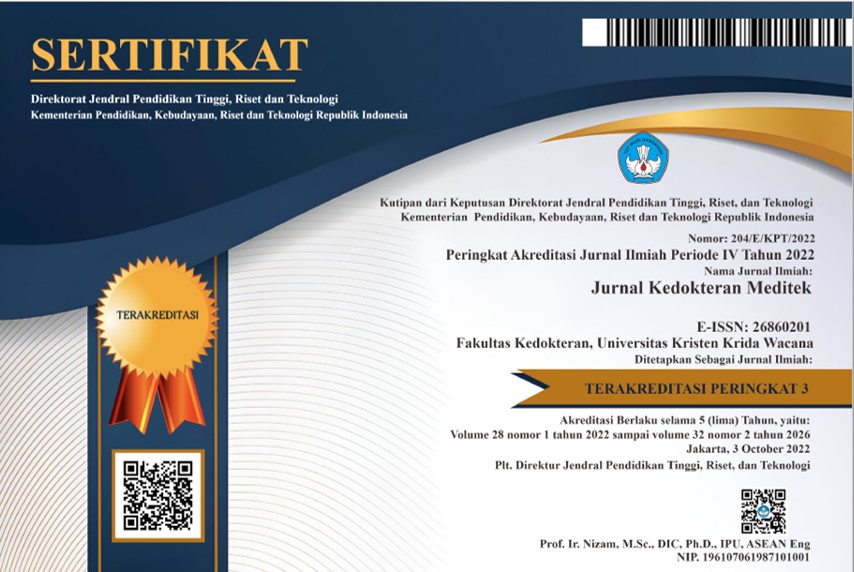Aplikasi Klinis Repetitive Transcranial Magnetic Stimulation (rTMS) pada Disfagia Neurogenik – Studi pada Stroke Iskemik Akut
DOI:
https://doi.org/10.36452/jkdoktmeditek.v29i3.2901Keywords:
disfagia neurogenik, rTMS, stroke iskemik akutAbstract
Disfagia paska-stroke mengakibatkan gangguan fungsi menelan karena terjadinya ketidakseimbangan koordinasi otot-otot menelan perifer dan regulasi sentral. Disfagia menyebabkan komplikasi berupa aspirasi, malnutrisi, hingga kematian. Studi menunjukkan bahwa penggunaan rTMS pada disfagia memberikan luaran klinis yang baik. Laki-laki 55 tahun; lemah separuh tubuh sisi kanan, bicara pelo, dan sulit menelan dengan onset 15 jam. Pasien memiliki riwayat stroke 1 bulan yang lalu dengan lemah separuh tubuh sisi kiri. Pemeriksaan fisik didapatkan hipertensi, GCS E4M6Vx, afasia motorik, parese nervus kranial VII dan XII dekstra tipe sentral, hemiparese dupleks dengan kekuatan 3 pada kedua ekstremitas kanan dan 2 pada kedua ekstremitas kiri. Hipertonus, peningkatan refleks, serta refleks patologis positif pada keempat ekstremitas. Pemeriksaan computed tomography (CT) scan kepala non-kontras, menunjukkan infark serebri bilateral. Pasien mendapatkan tata laksana anti-platelet, neuroprotektor, fisioterapi, dan 5 siklus rTMS. Setelah dilakukan 5 siklus rTMS, didapatkan perbaikan fungsi menelan, yang ditunjukkan dengan perubahan skor National Institutes of Health Stroke Scale (NIHSS) dari 18 menjadi 12, skor brief bedside dysphagia screening test-revision (BBDST) dari 8 menjadi 4, dan skor modified water swallowing test (MWST) dari 1 menjadi 5. Penggunaan rTMS terbukti memberikan luaran klinis yang baik pada disfagia neurogenik akibat stroke iskemik akut.
References
Mann G, Hankey GJ, Cameron D. Swallowing disorders following acute stroke: prevalence and diagnostic accuracy. Cerebrovasc Dis. 2000 Sep-Oct;10(5):380-6. doi: 10.1159/000016094.
Jang S, Yang HE, Yang HS, Kim DH. Lesions characteristics of chronic dysphagia in patients with supratentorial stroke. Ann Rehabil Med. 2017 Apr;41(2):225-30. doi: 10.5535/arm.2017.41.2.225.
Suntrup S, Kemmling A, Warnecke T, Hamacher C, Oelenberg S, Niederstadt T, et al. The impact of lesion location on dysphagia incidence, pattern, and complications in acute stroke – part 1: dysphagia incidence, severity, and aspiration. European Journal of Neurology. 2015;22(5):832-8. doi: 10.1111/ene.12670
Wen X, Liu Z, Zhong L, Peng Y, Wang J, Liu H, et al. The effectiveness of repetitive transcranial magnetic stimulation for post-stroke dysphagia: a systematic review and meta-analysis. Front. Hum. Neurosci. 2022:16:1-13. doi: 10.3389/fnhum.2022.841781
Simons A, Hamdy S. The use of brain stimulation in dysphagia management. Springer Publication. 2017 Apr;32(2):209-15. doi: 10.1007/s00455-017-9789-z.
Walton J, Silva P. Physiology of swallowing. Surgery. 2018;36(10):529-34. https://doi.org/10.1016/j.mpsur.2018.08.010
Sasegbon A, Hamdy S. The anatomy and physiology of normal and abnormal swallowing of oropharyngeal dysphagia. Neurogastroenterology and Motility. 2017;29(11):1-15. doi: 10.1111/nmo.13100
Mandysova P, Ehler E, Skvrnakova J, Cerny M, Bartova I, Pellant A. Development of the brief bedside dysphagia screening test – revised: a cross sectional Czech study. Acta Medica. 2015;58(2):49-55.
doi: 10.14712/18059694.2015.93.
Horiguchi S, Suzuki Y. Screening tests in evaluating swallowing function. The Journal of The Japan Medical Association. 2011;4(1): 31–4,
Murakami K, Hirano H, Watanabe Y, Edahiro A, Ohara Y, Yoshida H, et al. Relationship between swallowing function and the skeletal muscle mass of older adults requiring long-term care. Geriatr. Gerontol. Int. 2015 Oct;15(10):1185-92. doi: 10.1111/ggi.12572.
Brodsky MB, Suiter DM, González-Fernández M, Michtalik HJ, Frymark TB, Venediktov R, et al. Screening accuracy for aspiration using bedside water swallow tests: a systematic review and meta-analysis. Chest. 2016 Jul;150(1):148-63. doi: 10.1016/j.chest.2016.03.059.
Speyer R, Baijens L, Heijnen M, Zwijnenberg I. Effects of therapy in oropharyngeal dysphagia by speech and language therapists: a systematic review. Dysphagia. 2010;25:40-65. doi: 10.1007/s00455-009-9239-7
Khedr EM, Abo-Elfetoh N, Rothwell JC. Treatment of poststroke dysphagia with repetitive transcranial magnetic stimulation. Acta Neurol Scand. 2009;119(3):155-61. doi: 10.1111/j.1600-0404.2008.01093.x
Yu J, Kim D, Park H, Chon SC, Cho KH, Kim SJ, et al. Semantic analysis of NIH stroke scale using machine learning techniques. International Conference on Platform Technology and Service (PlatCon). 2019. Pg 1-5. doi:10.1109/PlatCon.2019.8668961
Chiang CF, Lin MT, Hsiao MY, Yeh YC, Liang YC, Wang TG. Comparative efficacy of non-invasive neurostimulation therapies for acute and subacute poststroke dysphagia: a systematic review and network meta-analysis. Arch Phys Med Rehabil. 2019 Apr;100(4):739-50.e4. doi: 10.1016/j.apmr.2018.09.117
Papadopoulou SL, Ploumis A, Exarchakos G, Theodorou SJ, Beris A, Fotopoulos AD. Versatility of repetitive transcranial magnetic stimulation in the treatment of poststroke dysphagia. J Neurosci Rural Pract. 2018 Jul-Sep;9(3):391-6. doi: 10.4103/jnrp.jnrp_68_18
Cheng I, Sasegbon A, Hamdy S. Effects of neurostimulation on poststroke dysphagia: a synthesis of current evidence from randomized controlled trials. Neuromodulation: technology at the neural interface published by Wiley Periodicals LLC on behalf of International Neuromodulation Society. Neuromodulation 2021;24:1388–1401. doi: 10.1111/ner.13327
Du J, Yang F, Liu L, Hu J, Cai B, Liu W, et al. Repetitive transcranial magnetic stimulation for rehabilitation of poststroke dysphagia: a randomized, double-blind clinical trial. Clin Neurophysiol. 2016 Mar;127(3):1907-13. doi: 10.1016/j.clinph.2015.11.045
Zhong L, Rao J, Wang J, Li F, Peng Y, Liu H, et al. Repetitive transcranial magnetic stimulation at different sites for dysphagia after stroke: a randomized, observer-blind clinical trial. Front. Neurol. 2021 May 26;12:625683. doi: 10.3389/fneur.2021.625683
Liao X, Xing G, Guo Z, Jin Y, Tang Q, He B, et al. Repetitive transcranial magnetic stimulation as an alternative therapy for dysphagia after stroke: a systematic review and meta-analysis. Clinical Rehabilitation. 2017;31(3):289-98. doi:10.1177/0269215516644771
Downloads
Published
How to Cite
Issue
Section
License
Copyright (c) 2023 Reynard Febrian

This work is licensed under a Creative Commons Attribution-NonCommercial-ShareAlike 4.0 International License.

















